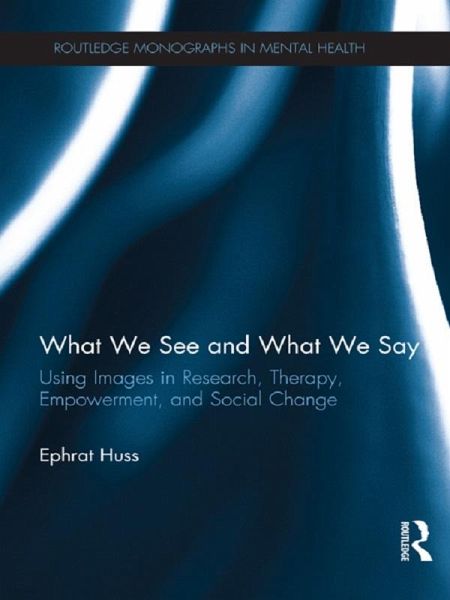
What We See and What We Say (eBook, PDF)
Using Images in Research, Therapy, Empowerment, and Social Change
Versandkostenfrei!
Sofort per Download lieferbar
49,95 €
inkl. MwSt.
Weitere Ausgaben:

PAYBACK Punkte
25 °P sammeln!
Image-based research methods, such as arts-based research, can fill the absence of the voice of impoverished, under-privileged populations. In What We See and What We Say, Ephrat Huss argues that images are deep and universally psycho-neurological constructs through which people process their experiences. The theoretical model demonstrated in this book demonstrates that images can be used to enable three different levels of communication: with self, with others similar to oneself, and with others who differ in terms of culture and power. Dr. Huss centers her argument on a case study of impover...
Image-based research methods, such as arts-based research, can fill the absence of the voice of impoverished, under-privileged populations. In What We See and What We Say, Ephrat Huss argues that images are deep and universally psycho-neurological constructs through which people process their experiences. The theoretical model demonstrated in this book demonstrates that images can be used to enable three different levels of communication: with self, with others similar to oneself, and with others who differ in terms of culture and power. Dr. Huss centers her argument on a case study of impoverished Bedouin women's groups in Israel who used art as self-expression, and includes many additional examples such as unemployed women and teenage girls in slums, women who have underwent sexual abuse, and the experiences of illegal immigrants. Ultimately, the author points to how the inherent structural characteristics of images help to intensify the voices of marginalized groups in research, therapy, empowerment, and social action.
Dieser Download kann aus rechtlichen Gründen nur mit Rechnungsadresse in A, B, BG, CY, CZ, D, DK, EW, E, FIN, F, GR, HR, H, IRL, I, LT, L, LR, M, NL, PL, P, R, S, SLO, SK ausgeliefert werden.













